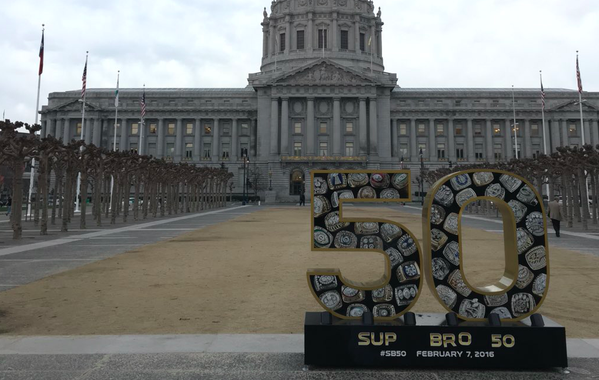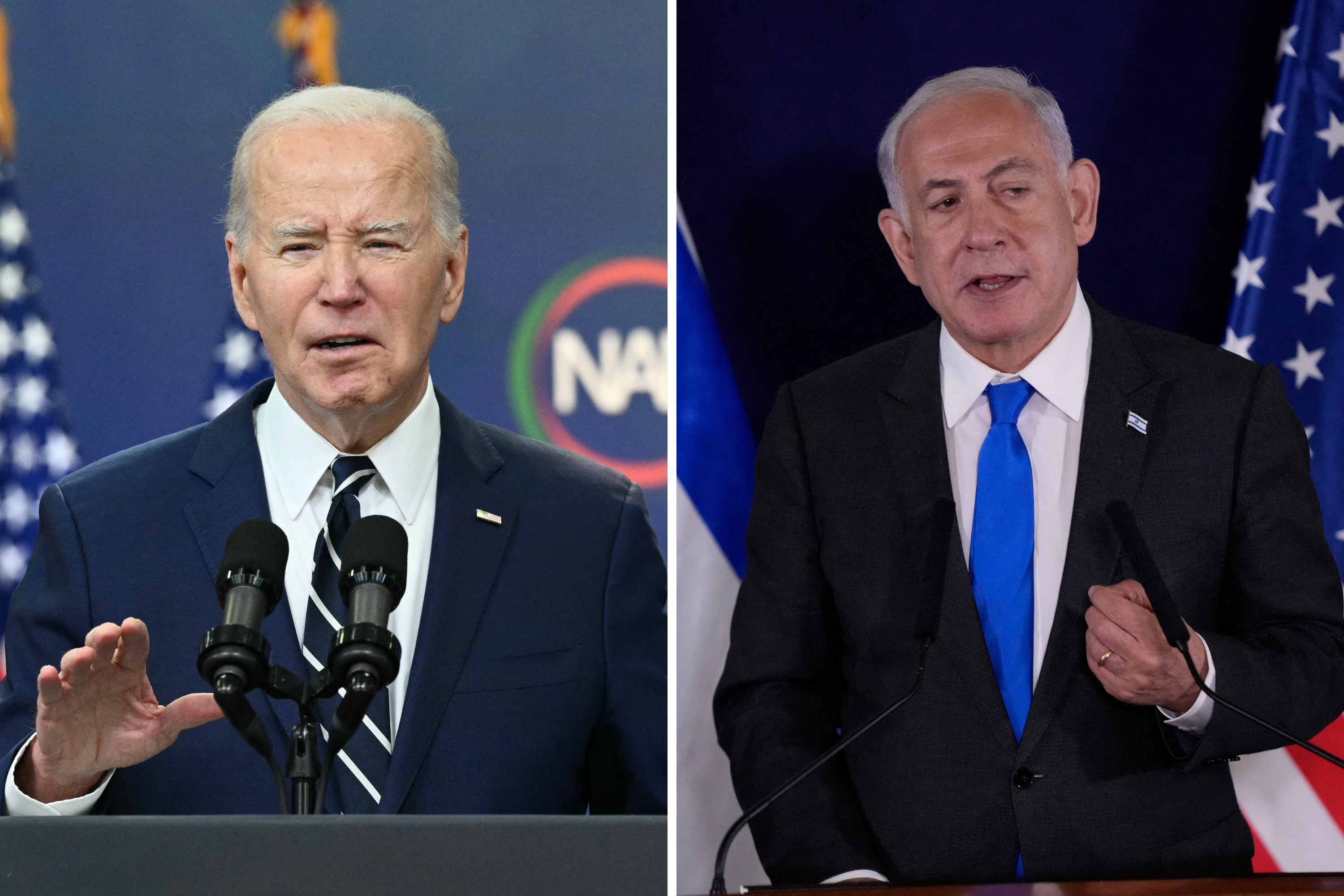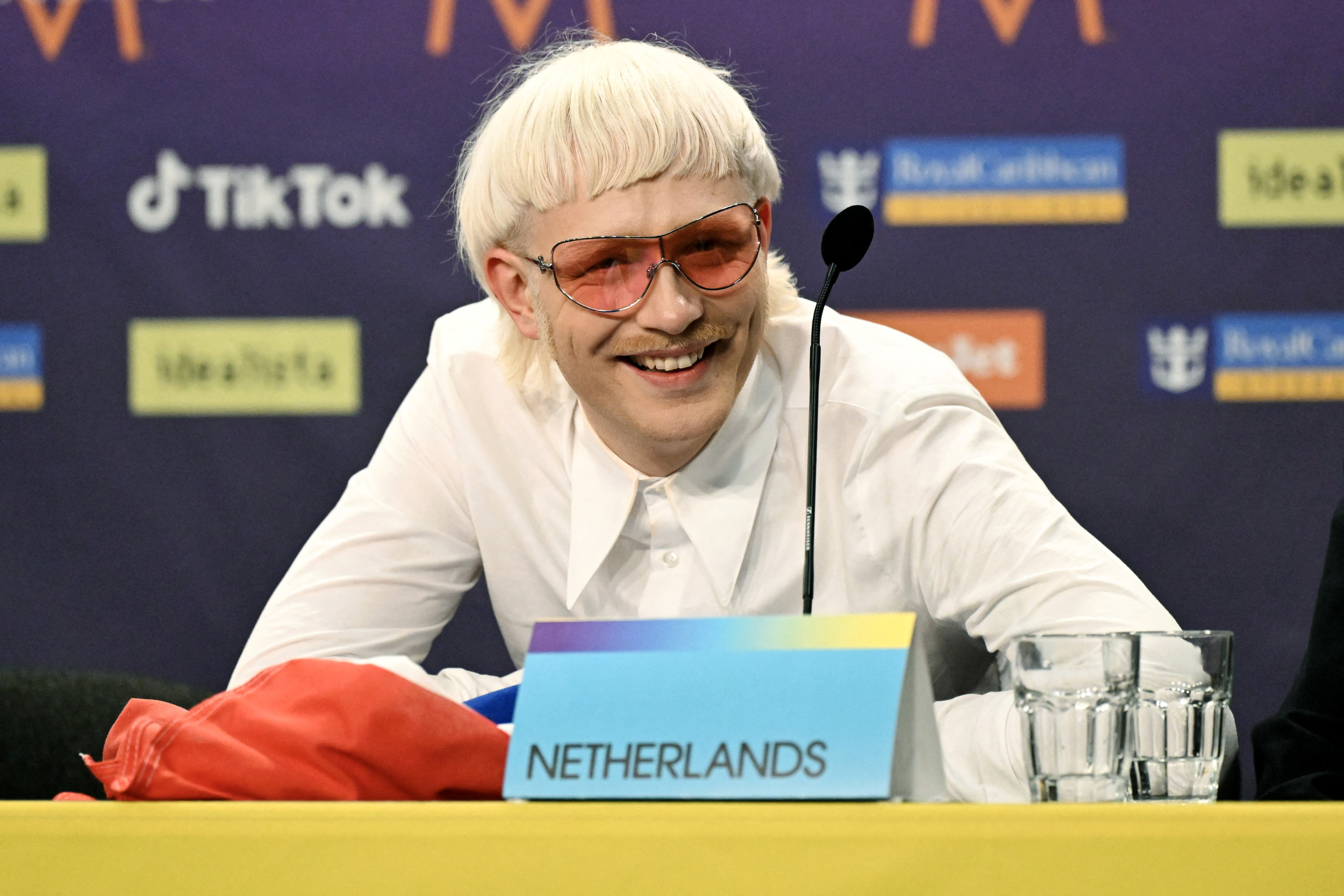
Perhaps it's the outspoken nature of San Franciscans, but this year's Super Bowl preparations in San Francisco have come under some very heavy criticism.
It's been so bad that Super Bowl-opposing politicians are asking for a refund from the NFL. Super Bowl statues have been repeatedly vandalized. Protests against police brutality occurred around the "Super Bowl City" site to take advantage of the event. A tent city has formed as homeless people have been pushed away from the downtown area.
That's just the tip of the iceberg. New details are coming out almost daily on San Francisco's dealings with the NFL and its preparation quagmires. Newsweek takes a stab at organizing all the grievances (so far) in one tidy place.
1. San Francisco is paying $5.3 million for Super Bowl celebrations.
All Super Bowl-related grievances start and end with this grievance. The city is shelling out millions of taxpayer dollars to accommodate the NFL, so much so that the city's budget and legislative analyst came out slamming the deal. And last week Supervisor Jane Kim introduced emergency legislation to force the city to renegotiate its deal with the NFL, saying the city had been hoodwinked.
Kim says she and the Board of Supervisors, San Francisco's legislative body that is composed of 11 elected supervisors, voted for just $307,843 in Super Bowl-related expenses in 2012, but somehow the costs ballooned to over $5 million. "We do not accept the idea that the best 'deal' we could cut is to crowd out San Franciscans for a corporate marketing party and then leave taxpayers with the bill," Kim and fellow Supervisor Aaron Peskin write in an op-ed for the San Francisco Chronicle.
2. There was no written contract for San Francisco's Super Bowl deal.
The $307,843 allotment was merely a motion to allow Mayor Ed Lee's office to make a bid to the NFL for the 2016 Super Bowl. What happened between the 2012 vote on the $307,843 and the NFL selecting San Francisco as the host city is unclear, due to a lack of paper trails, according to local alt weekly SF Weekly.
The terms of the bid were never given a public review. A briefing on the terms was available to members of the Board of Supervisors if they requested one, according to Nathan Ballard, a spokesman for the Super Bowl Host Committee. Previous sporting competitions held in San Francisco, like the America's Cup yacht-racing competition, had a written contract subject to public review.
3. The game isn't even hosted in San Francisco. It's hosted in Santa Clara, which already recouped all its Super Bowl costs.
The Bay Area is a remarkably balkanized region in terms of governance. San Francisco and Santa Clara—a small city about 45 miles south of San Francisco and home to Levi's Stadium, where the Super Bowl game will be held—made separate contracts with the NFL. Santa Clara signed two contracts to secure $3.6 million to recoup its costs. Kim and the other supervisors discovered Santa Clara's sensible contracting last week, which sparked the emergency legislation.
4. Defenders claim the costs will be filled through hotel and sales taxes, but will they?
Defenders of the Super Bowl have been arguing the costs are a drop in the bucket compared with the revenues the city will reap. A major source of revenue will be via hotel taxes. February, according to Ballard, is a slow month for San Francisco hotels, so the surge of tourists during Super Bowl week will bring in money from hotel taxes. But hotel occupancy rates during February in the past two years have hovered around 90 percent, leaving few vacant hotel rooms for the tourism surge, according to San Francisco Magazine.
5. Mayor Lee has been extremely opaque during questioning.
Lee was subject to some harsh questions from the Board of Supervisors last week, such as who in the mayor's office was in charge of making the non-written agreement. He deftly evaded all of them. Lee said the Super Bowl is a "civic celebration" similar to the local Pride Parade—which seemed like a stretch. "Sadly, some people insist on finding the negative aspects of Super Bowl 50, but I don't think that helps our city," he chided.
Former Mayor Willie Brown, Lee's longtime political mentor, who was in office during the dot-com boom and was notorious for his "pay-to-play" politics, wrote a column for the Chronicle telling naysayers to "stop complaining." Brown sat on the Super Bowl Host Committee, which was the middleman between the NFL and San Francisco in bringing the Super Bowl to the area. "Everyone is going to make a killing [during the Super Bowl]," Brown said in his column.
6. The homeless population has been driven into a "tent city" by the cops.
Fusion's Michael Rosen broke the story on how San Francisco's homeless population has been driven out of neighborhoods near the "Super Bowl City" construction site to a highway overpass in the Mission District, 2.5 miles away. The police have been actively moving the homeless into a four-block area, creating a Hooverville-like tent city, according to several homeless people who spoke to Fusion. Supervisor Scott Wiener has been under fire for asking that the tent camps be cleared in a prompt and "humane" way, even though San Francisco is in the middle of an El Niño rain season.
Lee's office told Bloomberg its Super Bowl workers have not encouraged homeless people to leave the Super Bowl City site. The Super Bowl Host Committee says it will donate $13 million to local charities that address homelessness and poverty, according to Bloomberg.
7. Municipal workers are asked to work overtime as "volunteers" to keep expenses off the books.
That $5.3 million bill could be much higher if it weren't for the off-the-books tactics city agencies are using, according to the San Francisco Examiner. The San Francisco Municipal Transportation Agency asked some of its employees to volunteer at Super Bowl City as ambassadors. The SFMTA said the ambassadors would volunteer during regularly scheduled work time—which should technically count as Super Bowl-related expense. No wonder Kim has been calling the Super Bowl a "shell game."
8. Nobody is coming to the Super Bowl parties—so far.
On Super Bowl City's opening day, a whopping 7,000 people showed up for the party, according to SF Weekly's Chris Roberts. The head of marketing for this year's Super Bowl estimated around 1 million visitors would show up at Super Bowl City during the week before the big game. So just 993,000 more are needed to meet that target.
7,000 people attended #SB50 Super Bowl City in SF on opening day. Only 993,000 more to go before projections met. pic.twitter.com/mJySTLthKH
— Chris Roberts (@cbloggy) January 31, 2016
The lack of enthusiasm for Super Bowl City might be due to all the heavy security screening surrounding the site, which already has hampered commuters coming into downtown San Francisco via cars, light rail from the East Bay or by ferry across the bay.
9. The San Francisco Police Department is "totally disorganized" right now.
Joe Eskenazi of San Francisco Magazine tweeted that according to a San Francisco Police Department source, security for the Super Bowl has been totally disorganized, with cops having to walk or take taxis to get to their jobs during the game festivities. The worst part? The source says the SFPD knew this mess was likely to happen years ago, but the department is still stretched too thin.
SFPD source: #SuperbOwl policing "totally disorganized. Lack of cars. Cops walking, taking taxis." @sanfranmag
— Joe Eskenazi (@EskSF) February 1, 2016
SFPD source: plainclothes no-shows to work; they miss assignments emailed on evening or morning of job. Dept knew for years this was likely
— Joe Eskenazi (@EskSF) February 1, 2016
10. If you are in San Francisco this week, you most likely will get monitored and tracked.
It won't be just Facebook, Twitter and Google spotlighting the Super Bowl. The Department of Homeland Security (DHS) and the FBI are flocking to town for security purposes. Wired expects an "all hands on deck effort" from federal and local law enforcement and intelligence agencies to monitor and track people around the Bay Area as a security precaution. The SFMTA has quietly installed 25 surveillance cameras—"traffic cameras," it says—around the Super Bowl City.
The FBI and DHS are bringing in the big guns to track cars, faces and cellphones, according to Wired. It's going to be nearly impossible to not get tracked if you're in the Bay Area this week, unless you leave the area until the final whistle is blown.
Uncommon Knowledge
Newsweek is committed to challenging conventional wisdom and finding connections in the search for common ground.
Newsweek is committed to challenging conventional wisdom and finding connections in the search for common ground.
About the writer
Seung Lee is a San Francisco-based staff writer at Newsweek, who focuses on consumer technology. He has previously worked at the ... Read more
To read how Newsweek uses AI as a newsroom tool, Click here.






